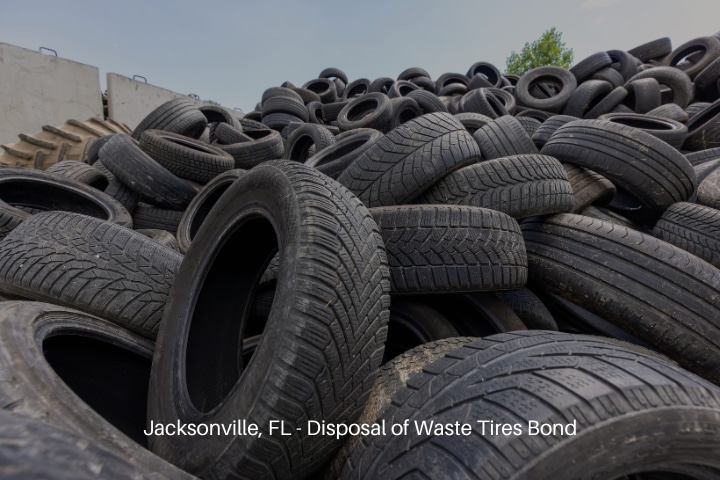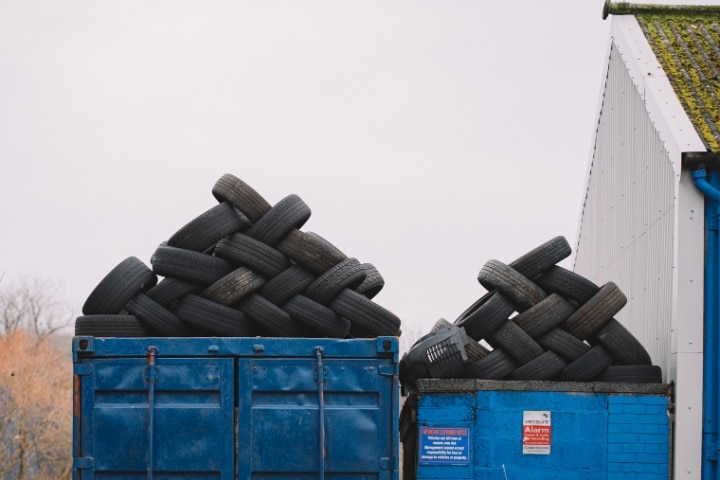
Get An Instant Quote on Jacksonville, FL – Disposal of Waste Tires Bond Now
Waste tires pose a significant environmental challenge, with their improper disposal leading to health hazards, habitat destruction, and fire risks. In Jacksonville, Florida, addressing the issue of waste tire management is essential for promoting environmental sustainability and public safety. The Jacksonville, FL – Disposal of Waste Tires Bond emerges as a crucial mechanism in managing this challenge, ensuring proper disposal practices and mitigating the adverse impacts of waste tires on the community. This article delves into the significance of this bond, its implications for waste tire management, and its broader contributions to environmental stewardship in Jacksonville.
Improperly disposed of waste tires can leach toxic chemicals into the soil and water, create breeding grounds for disease-carrying mosquitoes, and contribute to air pollution when burned. The Jacksonville, FL – Disposal of Waste Tires Bond plays a critical role in promoting proper waste tire management practices to mitigate these risks. By requiring operators to obtain the bond, the city establishes standards for the safe handling, transportation, and disposal of waste tires, thereby safeguarding public health and environmental quality.
Illegal dumping and tire stockpiling are common challenges associated with waste tire management, leading to blight, fire hazards, and negative impacts on property values. The Jacksonville, FL – Disposal of Waste Tires Bond serves as a deterrent against such practices by imposing financial consequences on operators who fail to comply with regulations. By holding operators accountable for the proper disposal of waste tires, the bond helps prevent illegal dumping, reduce tire stockpiles, and promote a cleaner, safer community for residents.
Waste tires represent a valuable resource that can be recycled into various products, such as playground surfaces, athletic tracks, and rubberized asphalt. The Jacksonville, FL – Disposal of Waste Tires Bond incentivizes operators to invest in recycling and resource recovery initiatives by incorporating provisions that support environmentally sustainable practices. By facilitating the recycling of waste tires, the bond contributes to the conservation of natural resources, energy savings, and the development of a circular economy in Jacksonville.
The Jacksonville, FL – Disposal of Waste Tires Bond serves as a cornerstone in the city’s efforts to manage waste tires responsibly and sustainably. By establishing standards for proper disposal practices, preventing illegal dumping, and promoting recycling initiatives, the bond helps protect public health, preserve the environment, and foster a cleaner, more resilient community. As Jacksonville continues to address the challenges of waste tire management, the importance of mechanisms like the bond cannot be overstated in promoting a greener, more sustainable future for generations to come.
The Jacksonville, FL – Disposal of Waste Tires Bond is a financial instrument aimed at regulating and overseeing the disposal of waste tires within the city. With this bond in place, waste tire processors and haulers commit to complying with industry regulations and best practices for the environmentally responsible disposal of waste tires. The bond amount serves as a form of financial assurance, guaranteeing that operators will fulfill their obligations and cover any potential liabilities associated with tire disposal activities.

Tire-derived aggregate (TDA) is a material made from shredded waste tires and used in various construction applications, such as lightweight fill, drainage, and noise barriers. While TDA offers benefits such as reduced material costs and enhanced performance, concerns exist regarding its long-term environmental impact, particularly concerning leaching of chemicals and stability over time. The Jacksonville, FL – Disposal of Waste Tires Bond incorporates provisions to address these concerns by requiring operators to adhere to strict guidelines for the use of TDA in construction projects. This may include measures such as environmental impact assessments, monitoring of leachate levels, and adherence to engineering specifications to ensure the safe and sustainable use of TDA in infrastructure development.
Traditional methods of recycling waste tires, such as shredding and grinding, have limitations in terms of efficiency, scalability, and environmental impact. To incentivize innovation and investment in alternative recycling technologies, the Jacksonville, FL – Disposal of Waste Tires Bond may offer incentives or grants to operators who adopt innovative approaches to waste tire recycling. This could include technologies such as pyrolysis, which converts tires into valuable products like oil, carbon black, and steel wire, or chemical recycling processes that break down tires into their constituent materials for reuse in manufacturing. By supporting the development and implementation of these technologies, the bond fosters a more sustainable approach to waste tire management while creating economic opportunities and reducing reliance on traditional disposal methods.
The transportation and storage of waste tires present logistical challenges and potential risks, including fire hazards, vermin infestation, and illegal dumping. To address these concerns, the Jacksonville, FL – Disposal of Waste Tires Bond imposes strict regulations on the handling, transportation, and storage of waste tires by bonded operators. This may include requirements for secure storage facilities, proper stacking and containment measures to prevent tire fires, and adherence to transportation safety standards during the hauling of tires. By enforcing these regulations, the bond helps minimize the environmental and public safety risks associated with waste tire disposal operations, ensuring that tires are handled and stored responsibly throughout the disposal process.
Axcess Surety is the premier provider of surety bonds nationally. We work individuals and businesses across the country to provide the best surety bond programs at the best price.